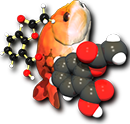The recommended browsers: Safari, Firefox, Chrome, IE(Ver.>8).
E-mail: jiedong@csu.edu.cn
 |
 |
 |
 |
 |
 |
Serine/threonine-protein kinase which is required for checkpoint-mediated cell cycle arrest, activation of DNA repair and apoptosis in response to the presence of DNA double-strand breaks. May also negatively regulate cell cycle progression during unperturbed cell cycles. Following activation, phosphorylates numerous effectors preferentially at the consensus sequence [L-X-R-X-X-S/T]. Regulates cell cycle checkpoint arrest through phosphorylation of CDC25A, CDC25B and CDC25C, inhibiting their activity. Inhibition of CDC25 phosphatase activity leads to increased inhibitory tyrosine phosphorylation of CDK-cyclin complexes and blocks cell cycle progression. May also phosphorylate NEK6 which is involved in G2/M cell cycle arrest. Regulates DNA repair through phosphorylation of BRCA2, enhancing the association of RAD51 with chromatin which promotes DNA repair by homologous recombination. Also stimulates the transcription of genes involved in DNA repair (including BRCA2) through the phosphorylation and activation of the transcription factor FOXM1. Regulates apoptosis through the phosphorylation of p53/TP53, MDM4 and PML. Phosphorylation of p53/TP53 at 'Ser-20' by CHEK2 may alleviate inhibition by MDM2, leading to accumulation of active p53/TP53. Phosphorylation of MDM4 may also reduce degradation of p53/TP53. Also controls the transcription of pro-apoptotic genes through phosphorylation of the transcription factor E2F1. Tumor suppressor, it may also have a DNA damage-independent function in mitotic spindle assembly by phosphorylating BRCA1. Its absence may be a cause of the chromosomal instability observed in some cancer cells. Promotes the CCAR2-SIRT1 association and is required for CCAR2-mediated SIRT1 inhibition (PubMed:25361978).
| Uniprot primary ID | O96017 |
| PDB ID | 2WTC 2WTD 2YCF 2XM8 2WTJ 2W0J 4A9T 4A9U 4A9R 4A9S 2XK9 2YCQ 2CN5 2YCR 2CN8 2WTI 3VA4 2XBJ 2W7X 3I6W 3I6U 2XM9 4BDJ 4BDK 4BDH 4BDI 4BDF 4BDG 4BDD 4BDE 4BDB 4BDC 4BDA 2YIT 1GXC 2YIQ 2YIR 2YCS |
| DrugBank ID | |
| BioGrid ID | 116369 |
| GuidetoPHARMACOLOGY ID | 1988 |
| PharmGKB ID | PA404 |
| KEGG ID | hsa:11200 |
| DIP ID | DIP-24270N |
| STRING ID | |
| IntAct ID | O96017 |
| DMDM | |
| BRENDA | 2.7.11.1 |
| Reactome | R-HSA-69473 R-HSA-69601 |
| SignaLink | O96017 |
| BioCyc | |
| Entrez Gene (Gene ID) | 11200 |
| BindingDB | O96017 |
| Fingerprint type | Sensitivity | SEN_std | Specificity | SPE_std | Accuracy | ACC_std | F1-score | F1-score_std | AUC | AUC_std | MCC | MCC_std | Download model |
|---|---|---|---|---|---|---|---|---|---|---|---|---|---|
| FP2 fingerprints | 0.880 | 0.005 | 0.886 | 0.003 | 0.883 | 0.005 | 0.883 | 0.005 | 0.953 | 0.005 | 0.770 | 0.000 | Download |
| Estate fingerprints | 0.828 | 0.006 | 0.810 | 0.005 | 0.819 | 0.003 | 0.822 | 0.004 | 0.890 | 0.000 | 0.638 | 0.006 | Download |
| MACCS fingerprints | 0.885 | 0.005 | 0.829 | 0.007 | 0.857 | 0.005 | 0.859 | 0.006 | 0.930 | 0.000 | 0.713 | 0.008 | Download |
| Daylight fingerprints | 0.686 | 0.007 | 0.972 | 0.003 | 0.829 | 0.003 | 0.801 | 0.006 | 0.900 | 0.000 | 0.688 | 0.008 | Download |
| ECFP2 fingerprints | 0.891 | 0.003 | 0.911 | 0.004 | 0.901 | 0.003 | 0.901 | 0.003 | 0.959 | 0.003 | 0.806 | 0.005 | Download |
| ECFP4 fingerprints | 0.865 | 0.005 | 0.973 | 0.003 | 0.919 | 0.003 | 0.913 | 0.005 | 0.950 | 0.000 | 0.841 | 0.006 | Download |
| ECFP6 fingerprints | 0.845 | 0.005 | 0.993 | 0.005 | 0.919 | 0.003 | 0.911 | 0.003 | 0.940 | 0.000 | 0.844 | 0.005 | Download |
| Positive dataset | Negative dataset |
The recommended browsers: Safari, Firefox, Chrome, IE(Ver.>8).
E-mail: jiedong@csu.edu.cn
 |
 |
 |
 |
 |
 |